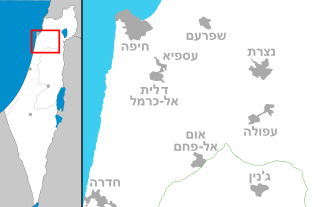This article describes the use of torture since the adoption of the 1948 Universal Declaration of Human Rights (UDHR), which prohibited it. Torture is prohibited by international law and is illegal in most countries. However, it is still used by many governments.
Black sites are clandestine detention centers operated by a state where prisoners who have not been charged with a crime are incarcerated without due process or court order, are often mistreated and murdered, and have no recourse to bail.

The Israel Prison Service, known in Israel by its acronym Shabas or IPS in English, is the state agency responsible for overseeing prisons in Israel. It is under the jurisdiction of the Ministry of Public Security. In 2014, its workforce was 8,800.
Administrative detention is arrest and detention of individuals by the state without trial. A number of jurisdictions claim that it is done for security reasons. Many countries claim to use administrative detention as a means to combat terrorism or rebellion, to control illegal immigration, or to otherwise protect the ruling regime.

Camp 1391, also referred to as Unit 1391 or Facility 1391, is an Israel Defense Forces prison camp in northern Israel for "high-risk" prisoners. It is run by Unit 504. The existence of the prison was unknown to the public before 2003, and most information about it remains classified, although the Supreme Court of Israel ordered the release of some information about the jail.

The Khiam detention center was an army barracks complex originally used by the French military in the 1930s in Khiam, French Lebanon. Following the establishment of independent Lebanon in 1946, it was used by the Lebanese military until the outbreak of the Lebanese Civil War in 1975, during which time it came under the control of the South Lebanon Army (SLA), an Israel-backed Lebanese Christian militia. With the beginning of the South Lebanon conflict in 1985, the base was converted into a prisoner-of-war camp and used to hold captured anti-Israel activists and militants. Those were mainly members of the Lebanese Communist Party, the Amal movement, and other leftist organizations. The facility remained in use in this capacity until Israel's withdrawal from Lebanon in May 2000 and the subsequent collapse of the SLA. After the Israeli withdrawal, the camp was preserved in the condition it was abandoned in, and converted into a museum by the Lebanese government.

Khalida Jarrar is a Palestinian politician. She is a member of the Popular Front for the Liberation of Palestine (PFLP) and the Palestinian Legislative Council (PLC). She was elected to the PLC in January 2006 as one of the PFLP's three deputies and has continued to serve as an elected representative ever since. She is also the Palestinian representative on the Council of Europe and is currently head of the Prisoners Committee of the PLC. She played a major role in Palestine's application to join the International Criminal Court.

Ofer Prison, formerly officially known as Incarceration Facility 385, is an Israeli incarceration facility in the Israeli-occupied West Bank. It is one of three prison facilities along with Megiddo and Ktzi'ot, the latter two located in Israel and not in the West Bank. Ofer Prison is run by the Israel Prison Service and like the other two facilities, used to be operated by the Israel Defense Forces' Military Police Corps.
The future of Palestinian prisoners detained by Israel in the context of the Israeli–Palestinian conflict is considered central to progress in the Israeli–Palestinian peace process. Cases of prison sentences include the charges of terrorism or being a member of an "illegal terrorist organization", such as Hamas or prior to the Oslo Accords the Palestine Liberation Organization, but according to some accounts also by political activism such as raising a Palestinian flag.
The Public Committee Against Torture in Israel is an Israeli NGO established in 1990 that monitors the use of torture and ill-treatment by Israeli security services against Palestinians under detention. PCATI was founded in 1990 in reaction to what it describes as "the ongoing policy of the Israeli government, which permitted the systematic use of torture and ill treatment in Shin Bet interrogations".

The Landau Commission was a three-man Commission set up by the Israeli Government in 1987 following a long-running scandal over the deaths of two Palestinian prisoners in custody and the wrongful conviction of a Circassian IDF officer. The Commission, headed by former Supreme Court Justice Moshe Landau, found that the GSS interrogators routinely used physical force during the interrogation of prisoners and then committed perjury at subsequent trials. In its conclusion, approved by Cabinet in November 1987, it lay down guidelines for the use of a "moderate measure of physical pressure". The details of the recommended methods were described in the classified appendix to the report. In 1994 the UN Committee Against Torture stated: "The Landau Commission Report, permitting as it does 'moderate physical pressure' as a lawful mode of interrogation, is completely unacceptable to this Committee."

Ktzi'ot Prison is an Israeli detention facility located in the Negev desert 45 miles (72 km) south-west of Beersheba. It is Israel's largest detention facility in terms of land area, encompassing 400,000 m2.

Salah Hamouri is a French-Palestinian lawyer and field researcher for the Addameer Prisoner Support and Human Rights Association. His wife – who is French – has been barred since January 2016 from entering Israel or the Israeli-occupied West Bank to visit him.
Khader Adnan Mohammad Musa was a Palestinian activist and prisoner in Israel who died after an 87-day hunger strike in protest of his detention without trial. By the time of his death, he had been arrested 12 times by Israel. He became prominent as a figure after a 66-day hunger strike in 2011 that led to a mass hunger strike among Palestinian prisoners and his ultimate release.
Prisons in Bahrain are fully owned and operated by the state. They are run by 3 different security forces, including the National Security Agency (NSA), the Bahrain Defence Force (BDF) and the Ministry of Interior (MoI). Administration of prisons is overseen by a number of judicial authorities, as well as the public prosecution. Out of a total of 20 prisons, there are 4 main prisons, one of which is for women. The main prisons are: Al Qurain Prison, Dry Dock Detention Center, Juw Prison and Isa Town Detention Center for women.
Israeli torture in the occupied territories refers to the use of torture and systematic degrading practices on Palestinians detained by Israeli forces in both the West Bank and Gaza Strip. The practice, routine for decades, was eventually reviewed by the Supreme Court of Israel in 1999, which found that "coercive interrogation" of Palestinians had been widespread, and deemed it unlawful, though permissible in certain cases. Torture is also practiced by the Palestinian authorities in the West Bank and the Gaza Strip.
Bushra al-Tawil or Bushra al-Taweel is a Palestinian journalist, former Palestinian prisoner and prisoners' rights activist from Ramallah who has frequently been held under administrative detention without charge by Israel. She is the spokesperson for the Aneen Al-Qaid Media Network, a local news agency specialized in covering news about the Palestinian detainees, and political prisoners.
Addameer, officially Addameer Prisoner Support and Human Rights Association, is a Palestinian NGO based in Ramallah.

Since the outbreak of the Israel–Hamas war on October 7, 2023, Israel has carried out mass arrests and detentions of Palestinians. Thousands have been arrested in the Israeli-occupied Palestinian territories and in Israel, based on alleged militant activity, offensive social media postings, or arbitrarily.

During the Israel–Hamas war, Israel has systematically tortured Palestinians detained in its prison system. This torture has been reported by the United Nations, Human Rights Watch, Amnesty International, as well as Israeli nonprofit human rights organizations such as Physicians for Human Rights Israel and B'Tselem.











